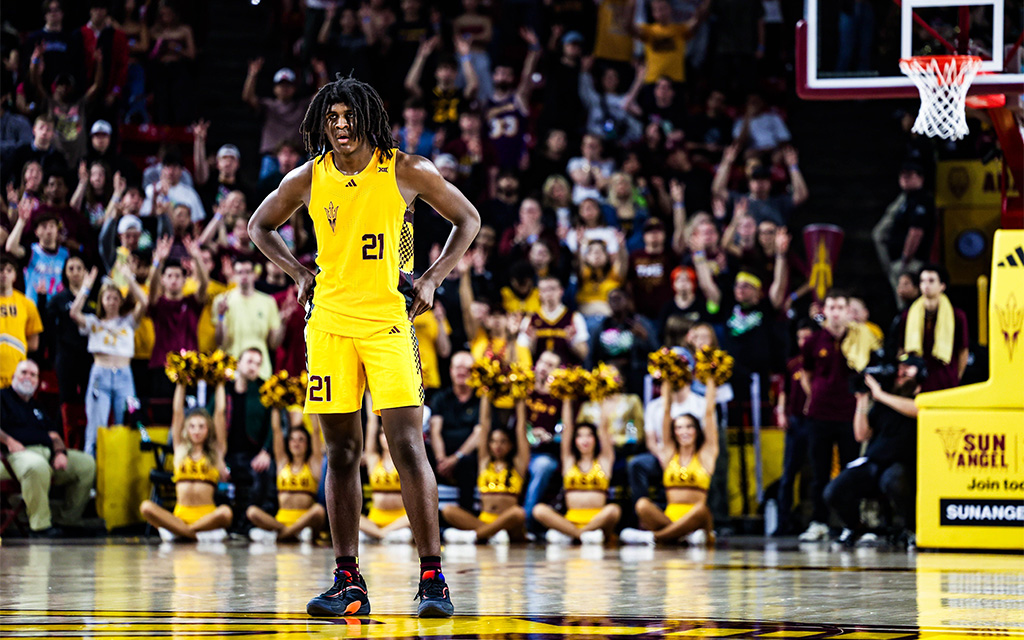PHOENIX — The new norm in college basketball of players leaving for greater opportunities financially and on the basketball court has struck Arizona State harder than most. After just one season playing for ASU, star forward Jayden Quaintance decided to transfer to Kentucky, his father told ESPN Tuesday.
“I’m sure they paid him a lot more money than Arizona State, that’s the bottom line,” college basketball analyst Seth Davis said. “It’s going to be hard for any school to outbid Kentucky.”
Sometimes, the second time’s a charm and Quaintance is banking on that feeling by transferring to Lexington. The young forward originally committed to Kentucky as a five-star recruit before decommitting when former Wildcats coach John Calipari bolted to become the coach of the Arkansas Razorbacks.
“We always liked Kentucky,” Haminn Quaintance told ESPN. “We were always hoping they’d come back around and recruit him.”
Upon entering the portal, the 17-year-old Quaintance became the No. 3 transfer option in the nation behind veteran stars Yaxel Lendeborg and Bennett Stirtz, according to the On3 recruiting site.
Financial opportunity has often motivated player movement in collegiate athletics since the NIL and transfer portal era began. Arizona State’s NIL pool for its men’s basketball program has remained a topic of discussion in recent years, with critics pointing to the success of more prominent power conference programs. That issue and a lack of retention at Arizona State go hand-in-hand in Davis’ eyes.
“(Bobby Hurley) doesn’t have enough money to pay players,” Davis said. “What’s wrong with the program is they’re not giving that coach the money he needs to retain his players. … We keep saying Bobby Hurley’s on the hot seat. If you want him to win, you have to give him the resources to have his roster.”
In his lone season playing for the Sun Devils, Quaintance averaged 9.3 points, 7.8 rebounds and 2.6 blocks per game across 24 games. He suffered a knee injury in late February and recently elected to undergo surgery to repair a torn ACL.
Despite limited appearances in Big 12 play, he was named to Big 12 All-Freshman and All-Defensive teams as the youngest player in college basketball.
“Kentucky presented us with a very detailed plan for how they plan on bringing Jayden back with the trainers and how they want to use him once he’s healthy,” Haminn Quaintance said.
The rising sophomore was a bright spot for the Sun Devils amid their 9-2 start to the season before other injuries and disciplinary issues derailed the campaign. The team ultimately finished 13-20 with a 4-16 record in Big 12 play.
Quaintance became the latest to officially depart for greener pastures in another year of extreme roster turnover for Hurley. He joined fellow highly touted recruits Joson Sanon, who bolted to play for Rick Pitino at St. John’s, and Amier Ali, who just entered the portal, as members of yet another exodus.
Barring a surprise return from redshirt senior Adam Miller, the Sun Devils will have lost all eight of its consistent rotation players from the season opener.
The five-star also became the latest in a long line of elite recruits to leave Tempe before reaching the peak of their collegiate careers. Josh Christopher, the highest rated prospect in school history before Quaintance, left for a professional career after one inconsistent season. Players including Marcus Bagley and Taeshon Cherry never panned out despite high grades. Remy Martin left and won a national championship at Kansas. Jaelen House, the son of ASU legend Eddie House, transferred to New Mexico and became an elite college guard. The pattern for Hurley’s program existed before Quaintance and clearly remains.
“The change is that you can transfer as much as you want without sitting out and then of course the big change is that you can now get paid,” Davis said. “It’s just in everybody’s financial interest to be in the portal every year.”
Hurley’s efforts to replace key members of the 2024-25 roster began immediately, with three incoming transfers secured already and one new recruit committed over the last week.
The system the program struggled with in the past few years is changing now as well, with the arrival of revenue sharing across collegiate athletics. Now, universities will be able to manage the amount of money each program receives.
“This used to be sort of donor driven with the NIL collectives and now it’s going to be more dictated by the university,” Davis said. “They can share up to 20 million dollars but it’s up to the school’s discretion as to where those dollars go.
“Most schools are going to spend probably 75% of that on football, so how much of that is left over? That’s what every coach is facing and I think (Hurley) is in a really tough spot because he just doesn’t have the resources that other schools have,” Davis said.
Unfortunately for Hurley, Quaintance, a consensus lottery pick in the 2026 NBA Draft, is irreplaceable. His elite rim protection ability and defensive instincts at such a young age propelled him up NBA draft boards. Being listed as a top draft prospect doesn’t guarantee success, however, and Quaintance will still have to prove himself at one of the nation’s top programs.
“I don’t think Mark Pope would bring him to Kentucky if Mark Pope didn’t think he was a really good player,” Davis said. “If Mark Pope thinks he’s good enough to play at Kentucky, then he must be really good but he has to prove himself. The difference is he’ll have better players around him … he’s going to have to beat guys out for minutes in a way that was not the case at Arizona State.”
While Quaintance will begin a new chapter in Lexington, Hurley will remain on the hot seat in Tempe once again, this time coaching under the cloud of a contract year.


